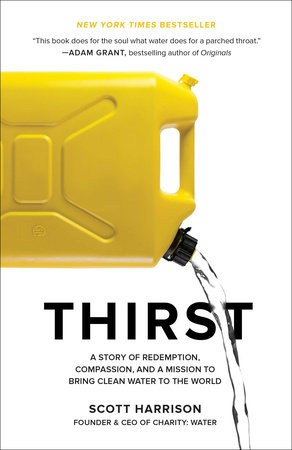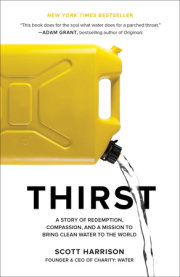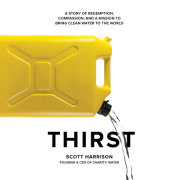1
Numb
New York City, Fall 2003
It started in my arms and legs. The nerve endings would go dead for twenty or thirty minutes, like I’d woken up on a limb that fell asleep. Sometimes the fingers of my right hand lost sensation, and then a prickly blanket of numbness would spread to my wrist and up my arm. I could’ve banged on my hand with a hammer and still felt nothing.
At first I thought there must be a simple explanation, like a pinched nerve. I was twenty-eight years old, with no history of serious illness. But when the episodes became more frequent, I got the name of a neurologist in Manhattan and made an appointment.
Sitting in the dingy waiting room, I nervously flipped through a half-dozen dog-eared magazines, hoping to take in some news from the real world. It was mostly bad. Bombings in Istanbul, suicide attacks in Iraq, the passing of Johnny Cash.
A nurse called me to the reception window and handed me a stack of forms to fill out. Name, age, height, and weight were easy--Scott Charles Harrison, twenty-eight, six foot one, and a slim 170 pounds, thanks to a steady diet of Marlboro Reds--but the long list of questions about my lifestyle wasn’t so simple. Looking through the packet, I realized that I didn’t dare answer truthfully, lest the doctors think the presentable college grad in front of them was some kind of degenerate.
Do you smoke cigarettes? (Two to three packs a day. Is that too much?)
Do you consume alcohol? How many drinks per day? (Up to ten drinks, but I try not to mix. My current favorites, in order: Champagne, beer, and vodka and Red Bull.)
Do you use recreational drugs? If so, how frequently? (Well, that really depends on how much I’ve had to drink. Cocaine, two to three times a week; Ambien to come down; MDMA whenever I can get my hands on it.)
Anyone who knew the full extent of my partying would’ve said it was no wonder I was finally having health problems. But I’d come here for a brain scan and a quick diagnosis, not a lecture. And the fact was, getting wasted every night was my job.
For the last ten years, I’d climbed the ranks of New York nightlife to become one of the top club promoters in the city. Most nights, you’d find me at the hottest party in town, sitting at the owner’s table with beautiful women, drinking expensive Champagne (or occasionally spraying it), and looking like the guy who had it all. And for a while, I did.
I was making about $200,000 a year but living like a millionaire, thanks to the perks. The place I called home was a big, industrial Midtown loft with a baby grand piano in the living room, a killer stereo system, and a private rooftop patio. Bacardi and Budweiser each paid me $2,000 a month just to be seen drinking their brands in public. On my wrist, I wore a Rolex Oyster Perpetual, which I loved to flash at club photographers with a knowing smirk. The watch had been a gift from my then-girlfriend, a nineteen-year-old Danish model whose face graced the covers of Vogue and Elle.
I hadn’t always lived like this. Ten years earlier, when I moved to the city and began collecting these superficial markers of success, one of my first mentors in nightlife said, “Scott, you’re too nice. If you’re going to do this right, you need to be seen out every night, spending money, with a hot model on your arm.”
Mission accomplished. But somewhere along the way, the sameness of nightlife--booze, drugs, girls, repeat--made me restless. I wanted change, and the more things stayed the same, the more booze, drugs, and girls I’d needed to force my mind and body to show up for work with a smile. It’s like what Ernest Hemingway said about going bankrupt: It happened gradually, then suddenly. For me, “suddenly” would involve a gun, a bottle of Scotch, and a cobalt-blue Mustang. But that comes later.
Over several weeks in the fall of 2003, I endured a battery of medical tests, searching for the cause of my numbness. Technicians examined my brain and spinal cord with an MRI and a CT scan, looking for possible culprits: tumors, blood clots, bone and tissue irregularities. Doctors put sensors on my arms and legs, monitoring the electrical activity from my brain to my muscles and nerves. Nurses stuck me with needles, drew blood, and ordered me to urinate in small plastic cups.
But in the end, all my tests came back normal. They couldn’t find anything wrong with me. I was simply going numb.
“Maybe it’s the cigarettes?” I said to my business partner, Brantly Martin, as I fumbled to open my third pack of Reds for the day. We were on our way to a club.
“Why don’t you try to cut down to two packs and chill on the booze?” he offered.
We joked about it, but inside, I was gripped with a quiet certainty that I was dying of some terrible disease that the doctors and their tests had missed. I used to find humor in darkness. I even laughed in the face of death once. It was a few years back. I was high on ecstasy and trying to get a friend’s attention, and I crashed my hands through the floor-to-ceiling windows of a building at New York University. The pane shattered into pieces, and shards of glass rained down, making cuts all over my face and hands. I bled all over the backseat of the cab on my way to the ER, but I couldn’t stop laughing about it. I didn’t care. At twenty-five, you think you’re going to live forever. Until one day, you don’t.
Alone in my loft later that night, I typed “numbness” into Google, trying to self-diagnose my condition. Trying to find a solution that the doctors couldn’t. There, high in the results, among the generic medical advice, I was surprised to see a religious essay. I clicked the link and got lost in a sermon about spiritual numbness, about how one’s conscience can become seared to the point where it no longer works. Near the end of the sermon, the author asked, “Are you right with God?”
As a child, I’d heard that question a hundred times from the pulpit, but now it filled me with existential terror. I wondered what would happen if I actually died. Would a childhood full of fervent bedtime prayers, Bible study, and church band still count? I wasn’t so sure. I turned off my computer and climbed into bed, my right arm still tingling like a pincushion being poked by a thousand needles.
My father’s worried voice filled my head. “Please pray for our son. He’s gone prodigal,” Dad would tell his friends at church.
It was true. When I left home at nineteen, I’d turned my back on faith, virtue, and just about everything else that mattered most to Chuck and Joan Harrison. I still called my parents every few weeks, though. Mom would always ask about my spiritual life. Dad would ask how the nightlife business was going, and then he’d pass along words of wisdom from the Bible, trying to reignite my interest in faith. “Uh-huh,” I’d say, before changing the subject. That’s how our conversations went for almost ten years. But now, at twenty-eight, although I’d never have admitted it to my father, I knew I had to change.
Just start over, I’d think to myself. Do something different with your life.
But I was too numb to make a move. And what would I do, anyway? You don’t just leave nightlife and become a successful doctor or lawyer or banker. I felt trapped in the shallow end of the pool.
And so, every night, I’d snort another line of cocaine and pass the rolled-up bill to another pretty girl and think to myself, This is not who I am. This is not who I want to be. This is not how I thought my life would turn out.
2
Poison
Moorestown, New Jersey, January 1980
On New Year’s Day 1980, my mother collapsed in her bedroom, unconscious. I was four years old and asleep in my own room, so I have no memory of my father lifting her to her feet as she briefly regained consciousness and then passed out again.
It would take another year before my parents figured out what was wrong with her, twelve more months before they learned that an invisible gas was spreading throughout our two-story Colonial home, robbing Mom’s body of oxygen and vitality.
Long-term, low-level exposure to carbon monoxide works like a steady drip of poison, with symptoms so subtle that doctors miss it all the time. For Mom, the effects came in the form of nausea; tight, throbbing headaches; and muscles that were too sore to lift a coffee cup. She figured she had the flu or was stressed out from having set up our new home.
We’d moved to Moorestown two months earlier so that my dad, Chuck, a sales manager for a manufacturing company, could shorten his one-hour commute to twenty-two minutes. The drab gray house wasn’t love at first sight, but my parents liked that it was on a cul-de-sac in a quiet, tree-lined neighborhood, and that there was a respected elementary school at the end of the block. Pragmatism won out.
My mom, Joan, thrives on order. She wanted everything to be perfect in time for Christmas, so she spent weeks inside our polluted house, unpacking, organizing, and hanging paintings on the walls. When she passed out on the floor, Dad called our neighbor, Dr. Joe Winston. He gave Mom a physical exam, and she scheduled a series of appointments with an infectious disease specialist and an allergist. They discovered that she was mildly allergic to mold and pollen, but they couldn’t find anything to explain the fatigue, soreness, or dizziness she was feeling. She kept looking for answers.
In the back of her mind, Mom wondered if chasing after me was just tiring her out. After all, ever since I learned to walk and talk, I’d been a strong-willed, curious kid with fast legs, a loud mouth, and boundless energy. Mom still tells the story about the time she took me with her to the bakery and I stuck my fingers into a fruit pie to find out if it tasted as good as it looked. She apologized to the baker and bought the pie. Next, we went to a bookstore, where I ripped the pages from a pop-up book. She bought the book. Next stop, a hardware store, where she rescued me seconds before I whipped a chainsaw off the shelf. That was the last time she took me shopping for a while.
The medical tests continued all throughout the spring, summer, and fall. But by winter, Mom was still sick and getting sicker. One day, she almost passed out making me oatmeal on the gas stove. Every time the heater in our house fired up, her heart would race.
“Joan, you do seem to feel better when you’re outside,” Dr. Winston said after reviewing another batch of inconclusive test results. “I wonder if something inside your house is making you sick?
That clue sent Dad to the library to do research on indoor pollution. He called the Environmental Protection Agency, and spent hours talking to experts about asbestos, formaldehyde, radon, and other common household pollutants. He had the gas company inspect our furnace, stove, and water heater. A chimney expert examined the fireplace flue. But everything checked out okay.
“What’s happening to me, Chuck?” Mom asked Dad one night in despair. “It’s been a year, and I’m only getting worse. I’m scared.” My dad, forever the optimist, is a consummate problem solver, but nothing he tried was helping her. Pretty soon his coworkers started questioning her illness. “Some women don’t take to change well,” they told him. “She’s probably just upset with you about having to move.”
Another colleague put it more bluntly: “Maybe it’s all in her head.”
If you ask Dad what first drew him to Mom, he’ll grin and tell you, “Her long legs.” In the summer of 1967, Dad spotted a pretty girl in a miniskirt at a party and walked up to introduce himself.
Mom took one look at the dark-haired naval officer in the crisp white uniform and knew exactly what she wanted. A few dates later, Joan Kleppinger informed her mother that she’d met the man she was going to marry. Chuck Harrison possessed all her “must-haves” for a husband. He was ambitious, smart, educated, tall, and good-looking. His sense of humor, she said, was a bonus.
At twenty-four years old, Mom had just earned a master’s degree in English. She was kind and caring, smart but gullible, and easy to bring to laughter--the kind of girl who remains a virgin until her wedding night. Dad was twenty-six, a hard-drinking, hard-smoking former naval officer who served on a 370-foot U.S. Navy destroyer while putting himself through business school. They dated for a year, spending Thanksgiving with Mom’s family and Christmas with Dad’s. By New Year’s Eve, Mom had practically picked out her wedding dress.
They got married in August of the next year, 1968, in a candlelight service. Mom walked down the aisle in a simple bridesmaid gown, arm in arm with her father. Mendelssohn’s Wedding March filled the chapel. Traditional music, followed by traditional vows.
“Do you take this woman to be your lawful wedded wife, to love her in sickness and in health, for richer or for poorer, until death do you part?” the minister said.
“I do,” Dad said, never taking his eyes off Mom--not knowing just how fiercely this vow would be tested.
Seven years later, on September 7, 1975, I came along, and then we were three. On the night I was born, Dad wasn’t content to sit on the sidelines. Instead, he stood by Mom’s side, watching the fetal monitor and coaching her through the contractions.
“Come on, now . . .” he said. “Okay. You’re almost at the top. You’ve got it now! There you go!” The nurses called Dad the Howard Cosell of the delivery room.
At the time, Mom had been working as a feature writer and photographer for a suburban Philly newspaper, but she felt torn about going back to work. While second-wave feminism swept through the country and Time magazine awarded its 1975 Man of the Year cover to “American Women,” Mom decided this wasn’t her fight. She told my dad, “Jobs can wait, babies can’t.”
I can tell from family photo albums that this was the happiest time for her. She took me to the zoo and the children’s museum, to parks and family gatherings. I don’t have the memories to call upon, but I know that these were the only years in my life when Mom got to be a normal parent.
Copyright © 2018 by Scott Harrison. All rights reserved. No part of this excerpt may be reproduced or reprinted without permission in writing from the publisher.










